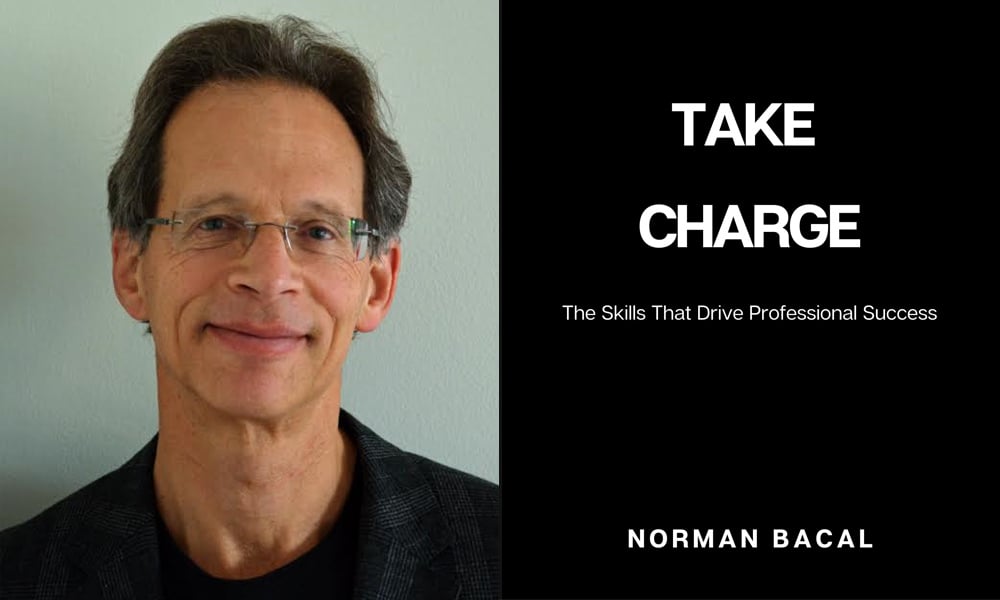
Fourth book by author Norman Bacal, the former managing partner of Heenan Blaikie LLP

Do not let fear hold you back from trying something new. For his new book Take Charge the Skills that Drive Professional Success, Norman Bacal interviewed 20 professionals in various stages of their career, from all different ethnic, religious and economic backgrounds, and found their success seemed to be driven by the same common principles, including one chief concept about which he heard from everyone.
“The thing that most likely is going to hold you back is your fear of trying something new, and, ultimately, your fear of failing,” says Bacal.
Bacal is the former managing partner of Heenan Blaikie, the firm which grew from a modest 50-lawyer Montreal shop when Bacal started, to 600 lawyers and an international footprint at its peak. In 2014, the firm collapsed. Bacal’s first book, Breakdown, tells that story. In 2019, he published his first novel Odell’s Fall, a tale of love, jealousy, deceit and murder, and the first in a series of mysteries based on plays of Shakespeare. The second, Ophelia, will be released in March.
“I always start my university lectures the same way,” Bacal says. “My opening line is always ‘I used to be you. How did I get to be me?’”
As a form of repayment to the profession, in Take Charge Bacal mines his own 35-year career and that of his interview subjects to “answer all the questions that I didn’t have the answers to when I was in law school,” he says.
The book includes a chapter on taking interviews. Bacal was a film finance lawyer, with clients including Warner Brothers, MGM, Sony and Lionsgate. He led a prominent Canadian law firm for 16 years. But before that, as a “kind of nerdy” introverted McGill student with an interest in tax law, he said he failed in all his attempts to attract an employer, until landing a gig with that “small Montreal law firm.”
Bacal’s advice comes from lessons he learned through his own challenges as an interviewee, as well as what impressed him when he was on the other side. He says most people are “various shades of introvert,” which can be a disadvantage when meeting prospective employers for the first time.
“You've got your 45 minutes. And if you don't have a plan for how you're going to survive those 45 minutes, you're going to lose. And it doesn't matter how smart you are or how good you would be,” he says.
“The problem with the interview process is it very often passes over the best candidates… It's so tied to the kind of impression you make on the people sitting in the room. And if you don't have a battle plan for the interview, you're starting at a disadvantage.”
Bacal spends three chapters of the book on communication, an aspect of professional life that has radically transformed since he began practising law.
“It was unfathomable that lawyers would ever work with computers or that we’d communicate by anything other than by phone or by letter,” he says. “… In my day, if somebody asked you a question, you wrote an eight-or-10-page memo, thoroughly investigating all the issues and coming to your conclusions, and you got a pat on the back. Now, if you can't encapsulate your answer in three lines, you’ve failed. Because nobody's going to read eight pages of anything anymore.”
Handling the pressure from clients’ expectation of round-the-clock availability is “the greatest challenge” lawyers now face, says Bacal.
Clients will also demand clear-cut and unambiguous answers to complex and multi-faceted questions and the key to becoming successful is giving advice that is “both effective and not negligence,” he says.
“You've spent three years in law school saying, ‘Well, maybe it's this. Maybe it's that. Lord Denning said this 100 years ago, then there's all this jurisprudence on it.’ And we're never sure of the answer because that's how you write your law exams,” says Bacal.
“And you get out in the real world. And the client says, ‘Okay, what do I do?’ And the answer can never be, ‘Well, maybe you should do this, or maybe you should do that. I'm not really sure. The courts aren’t clear.’ If you haven't mastered the answer to, ‘What do I do?’ you fail.”
The law school process also accustoms young lawyers to being successful at everything they have tried, he says. They practice, become excellent at certain things and it becomes harder to admit that they do not know how to do something new. Success comes from overcoming that fear and continually striving to learn new things, says Bacal.
“Everybody unanimously who I've interviewed says exactly that… ‘I succeeded because, in the end, I took on something I didn't know whether I could do. I learned how to do it. I got good at it. I succeeded.”